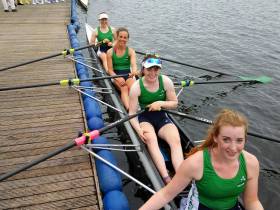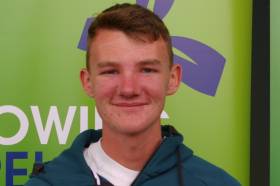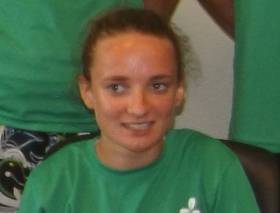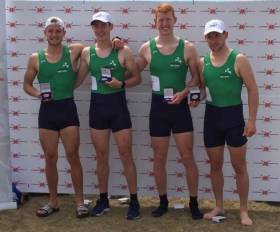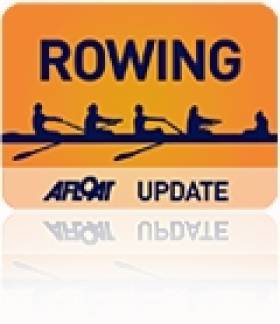Displaying items by tag: Home International Regatta
Home International Team Chosen From Twenty-Five Clubs
#Rowing: Ireland will be represented by a team from 25 clubs at the Home International Regatta on Saturday, July 27th, at Strathclyde Park in Glasgow. The junior women’s team includes Holly Davis (14), the new junior single sculls champion of Ireland.
Home International Team (July 27th, Strathclyde, Glasgow)
Men, Senior
Sweep
J McAnallen, T O’Reilly, Pres, Cork; W Ronayne, S O’Neill, Shandon; A Kelly, J Ronaldson, UCD; S Bolger, E Jarvis, UCD; R Heaney, C Conway, NUIG; S O’Brien, F Dolphin, Waterford (Lwt); Cox: J Russell, NUIG.
Sculling
D Breen, UCC; A Christie, Bann; C Mulready, Castleconnell; H Moore, Queen’s; C Scanlon, UCD; L Sutton, New Ross.
Women, Senior
Sweep
S O’Donnell, C O’Brien, NUIG, Univ of Limerick; K Shirlow, L Murphy, Bann, NUIG; L Colclough, L McCarthy, Commercial; M Sullivan, Z Hyde, Killorglin; A Mooney, S Mannion, NUIG; Cox: C O’Connell, UCC.
Sculling
G O’Brien, Kenmare; E Buckely, UCC; E Crowley, Kenmare; J Legreasley, Shandon, Lwt; K Egan, Carlow, Lwt; E Brogan, Queen’s, Lwt; K O’Brien, UCD, Para.
Men, Junior
Sweep
A Murphy, Shandon; K O’Donovan, Shandon; T Hume, Col Iognaid; S Reidy, Col Iognaid; M Cronin, Cork; Paul Beechinor, Cork; C Feely, C’Connell; C Nolan, C’connell; R O’Gorman, St Michael’s; D Hartney, St Michael’s; cox: P Tannian, Col Iognaid.
Sculling
C Brennan, R Brennan, Neptune; B Kennell-Webb, New Ross; T McKnight, A Keogh, Three Castles; D Kelly, Lee; T Orlic, Neptune.
Women, Junior
Sweep
E Carney Frazier, E Forde, Col Iognaid; J Harrington, J Forde, Shandon; E Loftus, K Vandlik, Commercial; M O’Byrne, E Murphy, St Michael’s; E Zakarauskaite, M Quinn, Galway; Cox: CR O’Gorman, St Michael’s.
Sculling
H Davis, Lee Valley; H Gahan, Cork; L Crowley, Fermoy; A Moloney, Commercial; E Benson, St Michael’s; P Mullin, Belfast; M Kidney, Lee.
Big Year for Three Rowing Codes
#Rowing: The year 2018 is set to be big one for Rowing Ireland. The National Rowing Centre will host a festival of rowing over three weeks in July. The Irish Championships, with an anticipated entry of over 1,100 crews, is first up. This is followed a week later by the Home International Regatta between Ireland, England, Scotland and Wales. The highlight of the festival will be the Coupe de la Jeunesse, which is a European junior tournament, with crews from 14 countries set to compete. All of this activity is taking place in Olympic or river style boats.
Now there are two other rowing codes under the Rowing Ireland umbrella.
In 2017 Rowing Ireland formed an Offshore Division. Offshore rowing or “FISA Coastal” rowing takes place in single, double and quad scull boats which are wider than Olympic boats and are self-bailing. The crews race a course with multiple turns around a single buoy where navigation is as important as pulling hard. The inaugural Irish Offshore Rowing Championships were held in Arklow in 2017. Over 20 crews competed in the FISA World Championships in France and they returned with a silver medal, taken by Monika Dukarska.
Rowing Ireland also created a Coastal Division in 2017. Coastal rowing has a tradition going back centuries and was often associated with boats rowing out to arriving ships to obtain work. Competition in traditional wooden boats or coastal fours takes place in lanes, with crews rounding individual buoys before returning to the start/finish line. The inaugural Irish Coastal Rowing Championships under the aegis of Rowing Ireland will take place in the National Rowing Centre in August on a separate part of the lake to the Olympic course.
Rowing Ireland brought boats from all three codes together for the first time at the National Rowing Centre on Saturday, February 24th for the picture above.
Ireland Lightweight Pairs Win at Home International Rowing
#Rowing: Ireland had two consecutive wins at the Home International Regatta in Strathclyde. The women’s lightweight pair of Gill Crowe and Hazel O’Neill won, and were followed quickly by the men’s lightweight pair of Colm Hennessy and Stephen O’Sullivan. At midday, Ireland’s senior women led the rankings, while England led in the boys’ and girls’ competition and in the senior men’s rankings.
#Rowing: Margaret Cremen and Aoife Casey have been chosen to represent Ireland at the World Junior Championships in August in Lithuania. The junior double, which took silver at the European Junior Rowing Championships in Germany last month, tops the list of selections for the big events for underage rowers.
Four crews have been chosen for the Coupe de la Jeunesse (one, the junior men’s double provisional on their performance at Cork Regatta). A big junior team has also been named for the Home Internationals, which will be held in Scotland in July.
| Junior Team Selections 2017 |
|---|
| The following junior teams have been selected to race at international regattas this coming summer. This list will be finalised after Cork Regatta. (Details can be found at the end of this document). |
| Junior World Championships (Trakai, Lithuania, August 2-6) |
| JW2x |
| Margaret Cremen (Lee Rowing Club) |
| Aoife Casey (Skibbereen RC) Coach: Dan Buckley (Lee RC) |
| (Eleanor Casey, Skibbereen RC will travel with the crew as chaperone). |
| Coupe de la Jeunesse (Hazewinkel, Belgium, July 29-30) |
| JM4x- |
| Barry O'Flynn (Cork BC) |
| Matt Dundon (Clonmel RC) |
| Jack Keating (Carlow RC) |
| James Quinlan (Castleconnell BC) Coach: Ray Morrison (Fermoy RC) |
| JM2x (Provisional based on performance at Cork Regatta) |
| Oisin Clune (Three Castles) |
| Rory Quinn (Three Castles) |
| JW2- |
| Ellie O' Reilly (Fermoy) |
| Gill McGirr (Fermoy) Coach: John Walsh (St Joseph's RC) |
| JM4- |
| Nathan Timoney (Enniskillen) |
| Barry Connolly (Cork BC) |
| Ross Corrigan (Enniskillen) |
| Aaron Johnston (Enniskillen) Coach: John Walsh (St Joseph's RC) |
| Home International (Strathclyde, Scotland, July 22) |
| Junior Women - Sweep Team (Full Team) JW 4+ |
| Siobhan Maxwell (Commercial) Aishling Keogh (Commercial) Mia Kovacs (Shandon) |
| Chelsey Minehane (Shandon) Cox: Vicky Hanlon (Cork BC) |
| JW4- |
| Mia Jane Elliot (Enniskillen) Zoe McCutcheon (Enniskillen) Caitlyn Fee (Enniskillen) Miriam Kelly (Enniskillen) |
| JW2- |
| Megan Tully (Shannon) |
| Megan Carmody (Shannon) |
| *The JW Eight will be a combination of the 4+ and the 4- |
| Junior Men - Sweep Team (One pair will be added after Cork Regatta) |
| Coach: Fran Keane (Presentation College RC) |
| Olly O' Toole (Commercial) Edward Meehan (Commercial) Michael Lynch (Commercial) Ewan Jarvis (Commercial) Tom McKeon (SMRC) |
| Dylan O' Byrne (SMRC) |
| Odhran Donaghy (Enniskillen) Cox: Rory Farragher (Enniskillen) |
| Coach: Stewart Davis (Lee RC) |
| Junior Women - Sculling Team (There will be two names added after Cork Regatta) |
| Cliodhna Nolan (Carlow RC) |
| Georgia O'Brien (Kenmare) |
| Ciara Browne (Workmans) |
| Anna O'Sullivan (Fermoy RC) |
| Ciara Moynihan (Workmans) Coach: TBC |
| Junior Men - Sculling Team (There may be two names added after Cork Regatta) |
| Aaron Christie (Bann) |
| Tadhg McKnight (Three Castles) Alex Byrne (Shandon BC) |
| Andy O'Toole (Carlow RC) |
| Ross O'Brien (Carlow RC) Coach: TBC |
| *All selections are subject to continued performance and a willingness to partake in organised squad sessions and training camps as deemed necessary. |
| CORK CITY REGATTA: |
| Any person who is not pre-selected on this document, and who wishes to be considered for the remaining Home International places on the Men's Sculling and Sweep teams and Women's sculling team, are asked to enter JUNIOR 18 A (Div.1) 1x or 2- at Cork City regatta (June 24/25). |
| The highest ranked 1x or 2- from the finals will be considered to fill these positions. If no boat makes final A, B or C then the fastest times from the heats will be used. (i.e. Grand league and trial format). |
| Coaches must email their athletes intention to race to [email protected] (Sweep) or to [email protected] (Sculling) by 14/06/2017 and also to submit their most recent 2k erg score. |
Three Wins for Ireland Crews at Home International Regatta
#Rowing: Ireland crews had three wins at the Home International Regatta at Cardiff Bay in Wales today. The all-Portora senior men’s four of Ryan Ballantine, Cormac McLaughlin, Lloyd Seaman and Barney Rix were victorious, though Ireland’s senior men finished third overall, behind England and Scotland.
Ireland’s senior women finished joint third with Wales, though they won the senior eight and four. Scotland outpointed England at the top of the table.
Ireland’s junior women amassed 19 points and finished a clear second behind England. The junior men finished on 16 points, the same tally as Scotland, behind clear winners England, on 25 points.
Home International Regatta, Cardiff (Selected results; points totals and Irish winners)
Senior Men: 1 England 32, 2 Scotland 30, 3 Ireland 25, 4 Wales 20. Four – 1 Ireland.
Junior Men: 1 England 25pts; 2 Ireland 16, Scotland 16; 4 Wales 10.
Senior Women: 1 Scotland 29, 2 England 27, 3 Ireland 23; Wales 23.
Eight: 1 Ireland. Four – 1 Ireland.
Junior Women: 1 England 23, 2 Ireland 19, 3 Scotland 18, 4 Wales 10.
#ROWING: Scotland topped off a remarkable win in the Home International Regatta with dominant wins in the senior women’s and men’s eights today in bright sunshine at the National Rowing Centre in Cork. Ireland finished second in the men’s eight, where the entire Scotland crew were from Edinburgh University and coached by Colin Williamson, once an Ireland team member. Scotland were the winners in the senior men’s and women’s classes, while England won the junior women’s and men’s titles.
Ireland finished third overall, placing second in men’s senior and junior classes.
Home International Regatta, National Rowing Centre, Cork
Overall Totals: 1 Scotland 106 pts, 2 England 101, 3 Ireland 79, 4 Wales 58. Men – Senior: 1 Scotland 34, 2 Ireland 29, 3 England 20, 4 Wales 17. Junior: 1 England 25, 2 Ireland 17, 3 Scotland 15, 4 Wales 13. Women – Senior: 1 Scotland 34, 2 England 28, 3 Ireland 20, 4 Wales 18. Junior: 1 England 24, 2 Scotland 23, 3 Ireland 13, 4 Wales 10.
Men
Eight: 1 Scotland 5:48.46, 2 Ireland 5:55.81. Junior: 1 England 5:58.48; 3 Ireland 6:08.84.
Four: 1 Ireland (T Deere, R Corcoran, D Buckley, K Coughlan) 6:11.85, 2 England 6:12.21. Junior: 1 Wales 6:24.97; 3 Ireland 6:33.09.
Four, coxed: 1 Scotland 6:31.05; 3 Ireland 6:48.43. Junior: 1 England 6:38.35, 2 Ireland 6:40.57.
Pair: 1 Ireland (N Murphy, A McKenna) 6:59.04, 2 Scotland 7:02.13, 3 England 7:25.08. Lightweight: 1 Scotland 7:07.86; 3 Ireland 7:17.19. Junior: 1 England 7:00.84, 2 Ireland 7:02.98.
Sculling, Quadruple: 1 Scotland 6:08.06; 3 Ireland 6:14.68. Junior: 1 England 6:10.89; 3 Ireland 6:27.26.
Double: 1 Scotland 6:40.76; 3 Ireland 6:51.88. Lightweight: 1 England 6:45.82; 3 Ireland 6:59.23. Junior: 1 Ireland (S Mulvaney, F McCarthy) 6:44.18, 2 England 6:45.59.
Single: 1 Ireland (E Grigalius) 7:12.90, 2 Scotland 7:21.52, 3 England 7:26.99. Lightweight: 1 Ireland (N Duncan) 7:22.39, 2 Scotland 7:26.29, 3 Wales 7:35.88. Junior: 1 Scotland 7:14.12; 4 Ireland 7:48.73.
Women
Eight: 1 Scotland 6:28.81; 3 Ireland 6:46.21. Junior: 1 England 6:40.71, 2 Ireland 6:46.72.
Four: 1 Scotland 6:50.28; 4 Ireland 7:21.12. Junior: 1 England 7:09.13; 3 Ireland 7:17.43.
Four, coxed: 1 Scotland; 3 Ireland 7:28.59. Junior: 1 Scotland 7:31.43; 4 Ireland 7:41.00.
Pair: 1 Scotland 7:36.50; 3 Ireland 7:49.83. Lightweight: 1 Scotland 7:50.28, 2 Ireland 8:01.28. Junior: 1 Scotland 7:47.97; 4 Ireland 8:01.67.
Sculling, Quadruple: 1 England 6:51.81; 4 Ireland 7:11.23. Junior: 1 England 6:57.40; 3 Ireland 7:09.94.
Double: 1 Scotland 7:28.98; 3 Ireland 7:39.57. Lightweight: 1 Scotland 7:22.07; 3 Ireland 7:48.63. Junior: 1 Scotland 7:33.87; 3 Ireland 7:45.72.
Single: 1 Wales 7:57.28; 4 Ireland 8:19.93.
Lightweight Single: 1 Ireland (E Desmond) 8:03.69, 2 England 7:4.02, 3 Wales 7:35.88. Junior: 1 England 8:14.03; 4 Ireland 8:30.05.
Pararowing: Trunk and Arms single sculls: 1 Ireland (K O’Brien) 4:51.98.



























